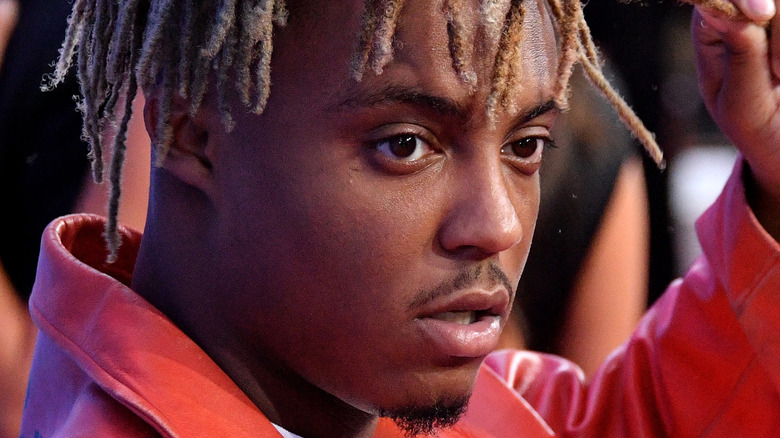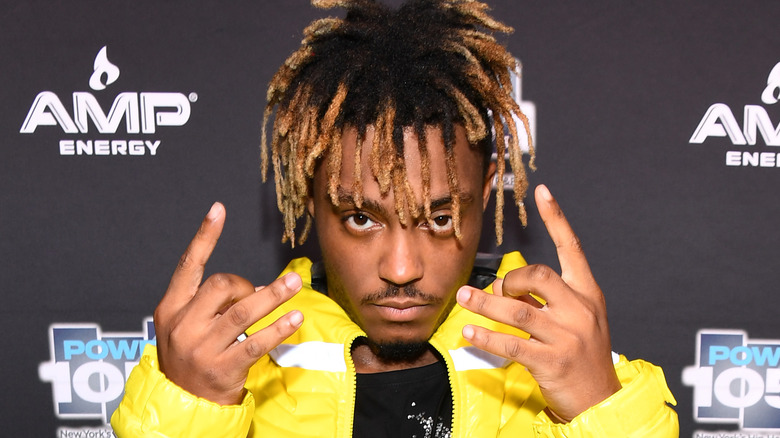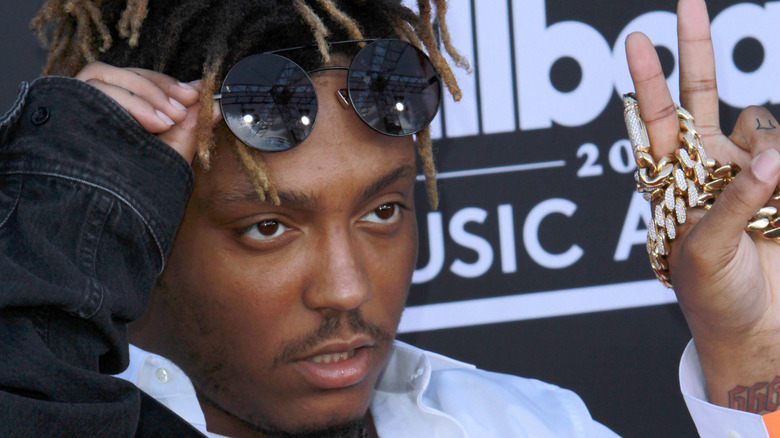What's The Real Meaning Behind Doom By Juice WRLD? Here's What We Think
The following article contains mentions of substance abuse.
Chicago Rapper Juice WRLD accomplished more than he could imagine in his short life, and his contributions to hip-hop will forever live on. The vulnerability of his lyrics mixed with his soulful vocals and captivating beats — it was almost impossible not to sing along. The young, emerging artist, whose real name was Jarad Higgins, is most known for his song, "Lucid Dreams." According to Forbes, it charted at No. 2 on the Billboard Hot 100 and has more than 1.8 billions steams on Spotify.
The music star had a troubled past and candidly spoke out about his addiction to drugs and alcohol, and dealing with other mental health issues. In the song, "Legends" he eerily predicted his own death when he rapped, "What's the 27 Club? / We ain't making it past 21." Juice WRLD died just days after his 21st birthday; according to TMZ, the rapper suffered a seizure at a Chicago airport after flying in from Los Angeles. His death was ruled an accidental overdose, per the outlet.
Since Juice WRLD's sudden death, the musician's camp has since released two posthumous albums — "Legends Never Die" and "Fighting Demons, both hitting No. 1 on Spotify and Billboard. And both albums gave fans a deeper look into the mind of the rapper and the struggles he truly faced.
Juice WRLD raps about drugs and his rise to fame on Doom
The track "Doom," on Juice WRLD's second posthumous album, "Fighting Demons," is a song that appears to highlight the rapper's drug use, his battle with his own thoughts, and how his life has changed in just a short time given his rapid success. The melodic record details the rapper's inner battle of thoughts when it comes to a toxic relationship with drugs and love.
In the first verse, he raps, "There's a room full of toxic people / But it feels like it's just me and her in the room / I'd rather me die before she / so I mix drugs up / Tryna find my doom / tryna find my doom." In the next verse, Juice WRLD looks at his life the way it was at the moment. "From broke to rich to finding love again / I said so much has happened in the last three months," he adds. "More drugs to mix / so high I don't pick up the phone no mo."
The bridge continues with his desire to find his "doom," but in his second verse he alludes to a young lady who may also be dealing with some similar sadness. "I'm f***ed up yeah / but you already knew / What's your favorite color besides blue? / You're always blue / You always been the one for me / you knew that too."
Juice WRLD discussed being introduced to drugs at an early age
Juice WRLD has always been open about his struggle with prescription pills and substance abuse. He references being under the influence in many of his songs, and he does the same in "Doom" as well. On the last verse of the track, he sings, "F***ed up / drunk driving on the avenue / Wrist hanging out the window / let the Rollie do, what it do."
During an interview with Hot 107.9, Juice WRLD revealed he was first introduced to Percocet as a freshman in high school. He also admitted that listening to hip-hop music promote drug abuse at such a young fueled his desire to want to drink lean in the sixth grade. "For the people who are really in this s***, it's not as easy as seeing somebody die and being like, 'Oh my god that's a wakeup call. I'm going to stop," he admitted when asked about what it was like to see other rappers dying to drug overdoses at a young age. "It'll make you think, damn, 'I don't want that to happen to me.' But, at the same time, you're already addicted to it. Your body is screaming for that," he added.
After his death, the rapper's mom said in a statement to TMZ, "We hope the conversations he started in his music and his legacy will help others win their battles as that is what he wanted more than anything. We know that Jarad's legacy of love, joy and emotional honesty will live on."
If you or anyone you know is struggling with addiction issues, help is available. Visit the Substance Abuse and Mental Health Services Administration website or contact SAMHSA's National Helpline at 1-800-662-HELP (4357).



